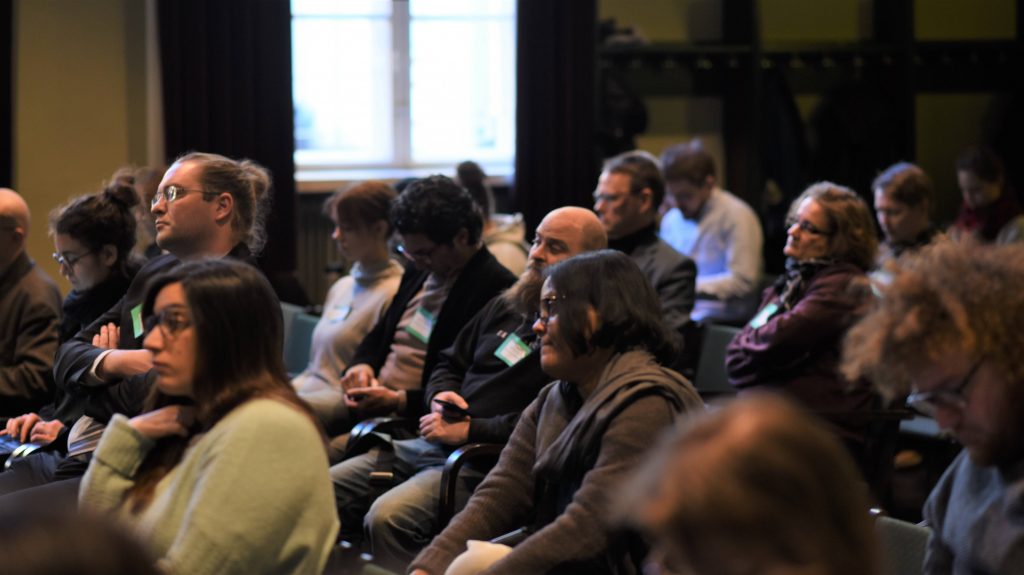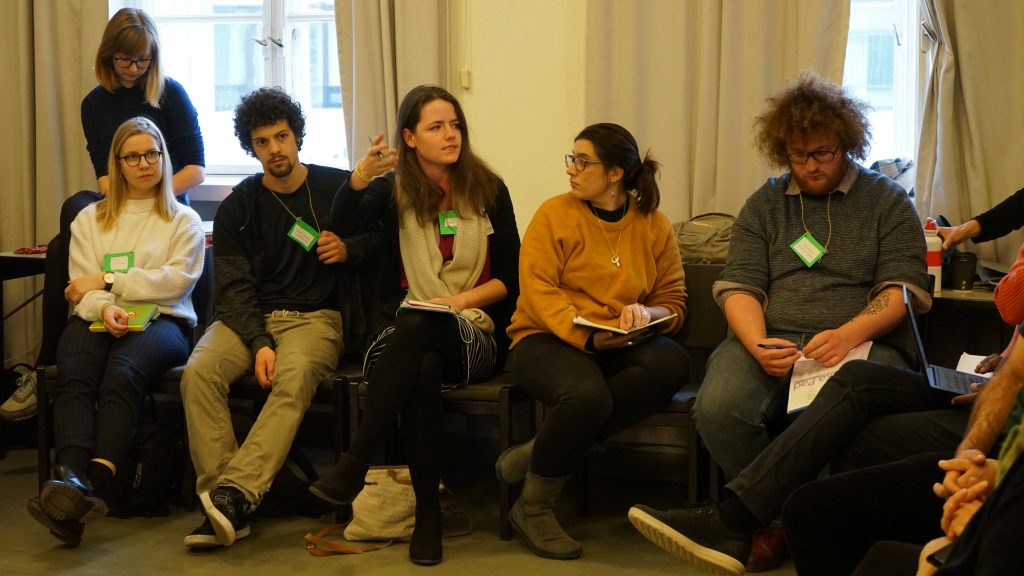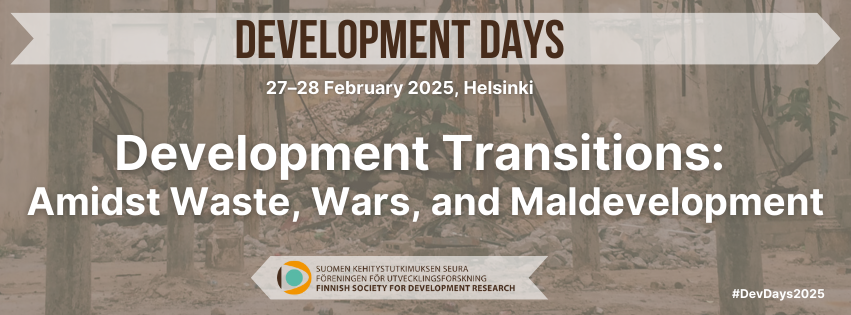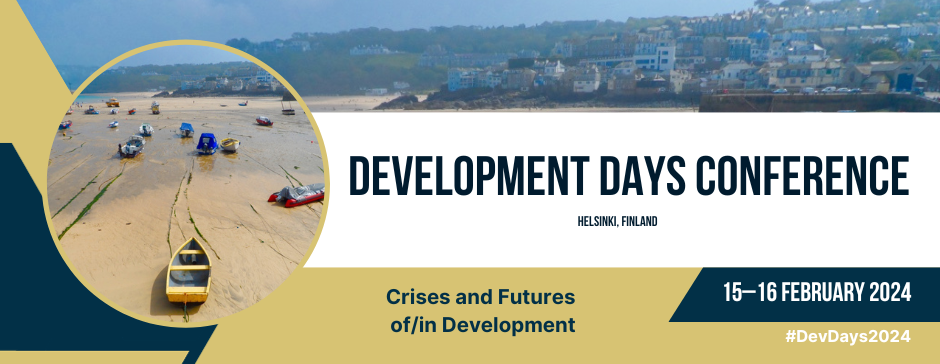Suomen kehitystutkimuksen seura järjestää vuosittain kansainvälisen konferenssin, joka keskittyy ajankohtaisiin kehityskysymyksiin. Konferenssit ovat keskeisimpiä kehitystutkimusta harjoittavien ihmisten ja yhteisöjen kohtaamispaikkoja Suomessa. Seura tekee myös yhteistyötä Pohjoismaisten sisarseurojensa kanssa.
The Finnish Society for Development Research organises an annual ‘Development Days’ conference that covers topical development issues. The conference is one of the most important annual meeting points for development researchers in Finland, and it cooperates with other Nordic development research societies.
Seuraava konferenssi / Next conference:
2026 Development in Ruins, Hope in the Cracks: A Time for Reckoning, Reclaiming, and Reawakening (26.-27.2.2026)
*Pääpuhujat / keynote speakers: Walden Bello (State University of New York at Binghamton) and Robtel Neajai Pailey (London School of Economics and Political Science)
Edelliset konferenssit / Previous conferences:
2025 Development Transitions: Amidst Waste, Wars, and Maldevelopment (27.-28.2.2025)
*Pääpuhujat / keynote speakers: Ali Kadri (Sun Yat-sen University), Manuela Picq (2024 ISA-IPE Outstanding Activist Scholar), Alina Sajed (McMaster University)
2024 Crises and Futures of/in Development (15.-16.2.2024)
*Pääpuhujat / keynote speakers: Jayati Gosh (University of Massachusetts Amherst), Barry Gills (University of Helsinki), Alfredo Saad-Filho (King’s College London)
2023 Conflicts and Development Revisited — Prospects for Peace in Times of Emergency (16-17.2.2023)
Järj. Kehitystutkimuksen seura ja UniPID
*Pääpuhujat: Swati Parashar (Gothenburg University), Tor A. Benjaminsen (the Norwegian University of Life Sciences), Andreas Bieler (University of Nottingham)
2022 Infrastructures, Technologies, and Vulnerabilities in Global Development (16.-18.2.2022)
Järj. Kehitystutkimuksen seura
*Pääpuhujat: Tania Li (University of Toronto), Timothy Oakes (University of Colorado Boulder) ja Nikhil Anand (University of Pennsylvania).
2021 COVID-19 Pandemic and Development Research: Ways Forward? (12.2.2021)
Järj. Kehitystutkimuksen seura
* Pääpaneeli: Barry Gills (Helsingin yliopisto), Bonn Juego (Jyväskylän yliopisto), Tiina Kontinen (Jyväskylän yliopisto) ja Elina Oinas (Helsingin yliopisto).
2020 Inequality Revisited: In Search of Novel Perspectives on an Enduring Problem (26.-28.2.2020)
Järj. Kehitystutkimuksen seura
* Pääpuhujat: Sango Mahanty (The Australian National University, Australia) ja Dan Brockington (Sheffieldin yliopisto, UK).
2019 Repositioning global development: changing actors, geographies and ontologies (27.2.-1.3.2019)

Development Days 2019 was held on 27.2-1.3.2019 in House of Science and Letters (Tieteiden talo), Helsinki, Finland. See the conference’s Book of Abstracts here.
Keynote speakers Giles Mohan, Ashish Kothari and Rosalba Icaza Garza.
Photos by Henri Onodera.
Among some of the most pressing global problems today are: i) the widening social inequalities within and between countries; ii) environmental pollution, ecological crises and conflicts over land and other resources; iii) migration, and the rise of extremism and populism; and iv) technological change contributing to increased risks to personal security and safety. While these issues are of complex origins, they are linked to globalization and the dominant global development model, in which corporate and individualistic interests stand above social and environmental ones, and logics, values and interests of Western countries stand above those of other countries. The magnitude of the crises linked to these global problems have led some academics, and some politicians to rethink their political and economic strategies and agendas.
At the same time, recent years have witnessed simultaneous trends of weakening of established global economic and political leadership on the one hand, and the emergence of new economic powers on the other. This has led to the ascent of new actors in the global development arena, most notably China, India and Brazil. They and many others are rapidly emerging from what the conventional economic model had labelled as ‘disadvantaged’ parts of the world, and are increasingly playing a key role in development processes worldwide. The crossroads at which humanity stands today requires a shift in development logics and paradigm. In this conference, we will discuss alternative development strategies and the role of emerging actors in development across multiple scales. Contributions from various disciplines, including human geography, environmental politics, development studies, sociology and institutional economics are called upon to discuss themes and questions, such as:
1. To what extent do global power shifts entail possibilities for more democratic—or conversely, more authoritarian—global governance?
2. What are the potentials of development and cooperation programmes in which problems and solutions emerge from geographical, societal, and gender-based margins?
3. Can we expect more socially and environmentally just, equality-laden and economically viable futures in the context of shifting geographies of development?
The conference will serve as a platform to share research findings and experiences, as well as to develop new ideas and strategies for shifting development narratives and agendas, for reconnecting actors from different scales, and critically examining and redefining the meanings and logics of development. We welcome development scholars from a plurality of disciplines and critical theories, as well as practitioners from a broad range of professional backgrounds to explore ways to engage in progressive debates of building bridges between actors, scales, movements and societies at multiple levels and beyond global-local binaries.

The working groups address a range of themes including decoloniality, transformations in social movements, social organisations, research and education, to name a few. In addition to working groups, the conference includes Master and Doctoral workshops, as well as a civil society event; offering a variety of opportunities for you to engage and present your research, to learn about other research in the field, and to strengthen your network.

More information can be found on the conference website: Repositioning global development: changing actors, geographies and ontologies.
2018 The Politics of Sustainability: Re-thinking resources, values and justice (15.-16.2.2018)
Järj. Kehitystutkimuksen seura
*Pääpuhujat: Jesse Ribot (University of Illinois), Sian Sullivan (Bath Spa University) and Jun Borras (Erasmus University Rotterdam).
While sustainability has become a central leitmotif in present day development discourse, the term itself remains highly problematic and contested. Recent developments such as the outcomes following the US elections, government budget cuts, austerity and the ongoing crisis in the Eurozone, as well as the global Agenda 2030 all raise the question to what extent the current sustainability debate actually addresses fundamental political concerns of social, environmental and ecological justice. Politicizing the concept of sustainability implies opening up critical debate on its content and practice in order to reveal its inherent elements of power relations and political contestations. The perennial question remains: can environmental, social and economic sustainability be made truly compatible, as suggested for example by the Agenda 2030; or are these different dimensions of sustainability rather profoundly antagonistic, as the current pace of resource extraction suggests? These competing views are largely determined by conceptions of “cost effectiveness” and “efficiency”, as seen in monetary valuation, percentage targets, indicators and results-based management promulgated by governments and business. Critically inquiring into the question hence requires going beyond more common analyses of the (political) economy of development and its imperatives, and tackling the deep-seated values and valuations underlying and transforming our understandings of resource use and governance as sustainable.
The 2018 conference examined the politics of sustainability by foregrounding values and moral choices implied by different pathways and current transformations. The participants aimed develop a more articulated analysis between discussions on sustainability – the on-going, problematic and highly uneven processes of extractivism, environmental change, migration, and social differentiation – and their consequences for social, environmental, and ecological justice. Topics of discussion were for example how alternatives are worked out in different contexts, networks and coalitions. For instance, what role do reporting mechanisms, indicators and measuring systems play in the politics of sustainability – whether linked to poverty, gender, or climate and environment? What do they reveal or obscure and what kinds of change do they promote? How would our value systems need to change in the future?
2017 Authoritarianism and Development (16.-17.2.2017)
Järj. Kehitystutkimuksen seura
*Pääpuhujat: Boris Kagarlitsky ja Susanne Dahlgren
2016 Making alternatives visible: Resisting and reshaping the mainstream (11.-12.2.2016)
Järj. Kehitystutkimuksen seura
*Pääpuhuja: Neera Chandhoke
Professor Neera Chandhoke delivers her keynote speech titled as “Realising justice” at the Development Research Day 2016 in Helsinki, February 2016. Video & editing: Mikael Kanerva.
2015 Rethinking Responsibility in Development: Contested Relations between Citizens, States and Corporations (12-13.2.2015)
Järj. Kehitystutkimuksen seura, Politiikan ja talouden tutkimuksen laitos (Helsingin Yliopisto), LYY Institute (Itä-Suomen yliopisto), University of Helsinki Global South Network (HUGS), University Partnership for International Development (UniPID).
* Pääpuhujat: Dinah Rajak ja Bernadetta Killian
2014 Inclusion/Exclusions? Communities, Identities and Value Systems Reconsidered (12.2.2014)
Järj. Kehitystutkimuksen seura, Politiikan ja talouden tutkimuksen laitos (Helsingin Yliopisto), Youth and Political Engagement in Contemporary Africa -hanke, University of Helsinki Global South Network (HUGS), University Partnership for International Development (UniPID).
* Pääpuhujat: Barry Gills (Helsingin Yliopisto) ja Claudia Mitchell (McGill University, Kanada/Kwa-Zulu Natal, Etelä-Afrikka)
2013 Knowing development – Developing Knowledge? (14.-15.11.2013)
Järj. Kehitystutkimuksen seura, The Association of Development Researchers in Denmark, The Norwegian Association for Development Research, The Finnish University Partnership for International Development, UniPID, Aalto-Yliopisto, KEPA, Helsingin yliopisto Kehitystutkimuksen oppiaine, Kehitystutkimuksen tohtorikoulu DEVESTU
* Pääpuhujat: Ritva Vainikka (Maailmanpankki) ja professori David Mosse (SOAS, University of London, Iso-Britannia), Alice Ndidde (Makerere University, Uganda), Robert Chambers (IDS, University of Sussex, Iso-Britannia), Göran Hydén (University of Florida, USA) ja Lisa Ann Richey (Roskilde University, Tanska).
2013 Civil Society and Development (8.2.2013)
Järj. KEPA, University of Helsinki Global South Network (HUGS), Itä-Suomen Yliopiston LYY-instituutti, Jyväskylän yliopisto, Development and International Cooperation -maisteriohjelma ja Helsingin Yliopisto, Kehitystutkimuksen oppiaine.
* Pääpuhujat: Henning Melber (Dag Hammarskjöld Foundation), Sisay Alemahu (Åbo Akademi) ja Mahdi Abdile (Kirkon Ulkomaanapu)
2012 Citizenship Transformations in a Global World (11.-12.2.2012)
Järj. Kehitystutkimuksen seura, UniPID, Nuorisotutkimusverkosto, Helsinki University Global South-verkosto ja Politiikan ja Talouden Tutkimuslaitos (Helsingin yliopisto).
* Pääpuhujat: Mervat Hatem (Howardin yliopisto, USA), Teivo Teivainen (Helsingin yliopisto), Sian Lazar (Cambridge, Iso-Britannia), Carles Feixa (Lleidan yliopisto, Espanja) ja Geoffrey Pleyers (Louvainin yliopisto, Belgia).
2011 Reframing Sustainability? Climate Change and North-South Dynamics (10.-11.2.2011)
Järj. Kehitystutkimuksen Seura, UniPID, Politiikan ja Talouden Tutkimuslaitos (Helsingin yliopisto), Suomen Ympäristökeskus, Kehitysyhteistyön Palvelukeskus, Siemenpuu Säätiö ja International Union for Conservation of Nature (IUCN).
* Pääpuhujat: Arun Agrawal (Michiganin yliopisto, USA), Shalmali Guttal (Focus on the Global South, Thailand), Markku Kanninen (Helsingin yliopisto), René Orellana (Bolivia) ja Petri Pellikka (Helsingin yliopisto).
2010 Crises, Conflicts and Development: Multifaceted Perspectives to Security (11.-12.2.2010)
Järj. Kehitystutkimuksen Seura, UniPID, Kriisinhallintakeskus (CMC Finland) ja Kehitysmaatutkimuksen laitos (HY).
* Pääpuhujat: Aili Tripp (Wisconsinin yliopisto, Madison, USA), Michaelle Browers (Wake Forestin yliopisto, USA), Wim Naudé (UNU WIDER) ja Elnour Abdalla Elsiddig (Khartoumin yliopisto, Sudan).
2009 Knowledge, Development and Academic Partnerships (19.-21.2.2009)
Järj. Kehitystutkimuksen seura ja UniPID (blogi)
* Pääpuhujat: Stephen Simukanga (Sambian yliopisto, Sambia), Luis Tapia (San Andrésin yliopisto, Bolivia), Seppo Hölttä (Tampereen yliopisto), Tania Li (Toronton yliopisto, Kanada) ja Giles Mohan (Open University, Iso-Britannia)
2008 Development, Justice and Governance: New Challenges in the Global South (24.-25.4.2008)
Järj. Kehitystutkimuksen seura, Kehitysmaatutkimuksen laitos (HY) ja EADI.
* Pääpuhujat: Stephanie Barrientos (Manchesterin yliopisto, Iso-Britannia), David Demeritt (Lontoon yliopisto, Iso-Britannia) ja Severine Rugumamu (Dar es Salaamin yliopisto, Tansania).
2007 Development Studies: Landscapes and Horizons (16.-17.2.2007)
Järj. Kehitysmaatutkimuksen laitos (HY) (www)
* Pääpuhujat: Terence Ranger (Oxfordin yliopisto, Iso-Britannia) ja Jean-Pierre Olivier de Sardan (l’Ecole des Hautes Etudes en Sciences, Ranska).



